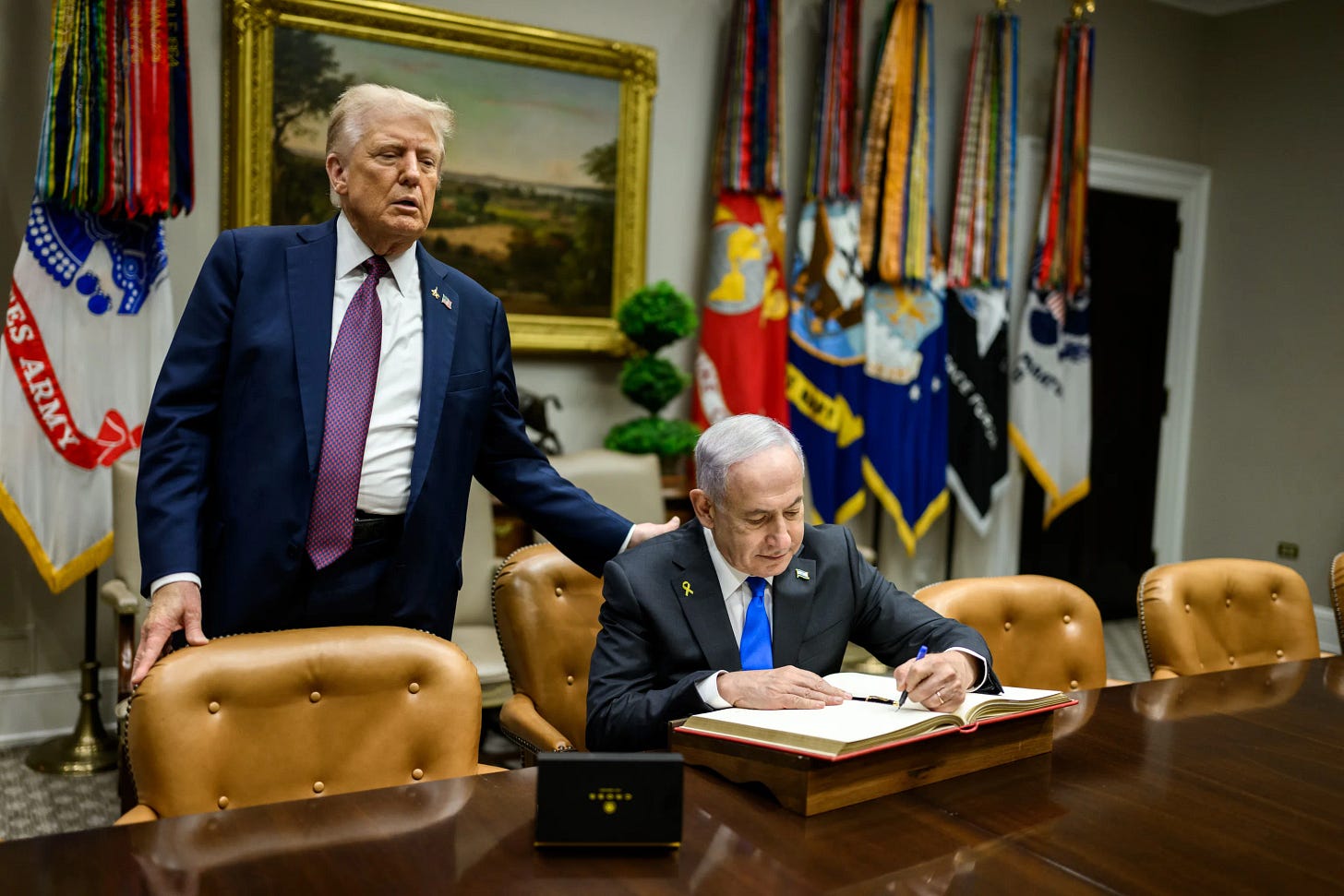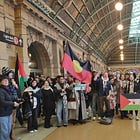Israel and Hamas Agree to First Phase of Trump Peace Plan, Hostage Release Expected Within 72 Hours
This piece is freely available to read. Become a paid subscriber today and help keep Mencari News financially afloat so that we can continue to pay our writers for their insight and expertise.
Today’s Article is brought to you by Empower your podcasting vision with a suite of creative solutions at your fingertips.
President Donald Trump announced Thursday via Truth Social that Israel and Hamas have agreed to the first phase of his Middle East peace plan, with all 20 living hostages expected to be released within 72 hours as Israeli forces prepare for partial withdrawal from Gaza, marking what regional experts describe as a potential turning point in the two-year conflict.
The agreement, which Trump disclosed through his social media platform, represents the culmination of intensive diplomatic efforts involving the United States, Qatar, Egypt, and Turkey. The announcement came during a White House event when Secretary of State provided Trump with a note stating negotiations were “very close” to completion.
“I was just given a note by the Secretary of State saying that we’re very close to a deal in the Middle East, and they’re gonna need me pretty quickly,” Trump stated during remarks, according to video footage showing the handwritten note with “very close” underlined.
The peace plan’s first phase focuses on hostage exchanges and partial military de-escalation in Gaza. According to reports from multiple sources, Hamas will release all living hostages on Saturday, with formal signing of the agreement scheduled for 12 p.m. local time in Cairo.
Truth matters. Quality journalism costs.
Your subscription to Mencari directly funds the investigative reporting our democracy needs. For less than a coffee per week, you enable our journalists to uncover stories that powerful interests would rather keep hidden. There is no corporate influence involved. No compromises. Just honest journalism when we need it most.
Not ready to be paid subscribe, but appreciate the newsletter ? Grab us a beer or snag the exclusive ad spot at the top of next week's newsletter.
Liberal Senator Dave Sharma, Australia’s former ambassador to Israel, characterized the development as potentially transformative for the region. “If it leads to an end of the conflict, a return of all the hostages, alive and sadly deceased, and the resumption of large-scale humanitarian aid to Gaza, then I think it’s overwhelmingly a very positive development,” Sharma told Australian media.
Sharma credited multiple parties for the diplomatic breakthrough. “Full credit to the US administration and President Trump and the regional countries involved, Qatar, Egypt and Turkey, for helping to facilitate this,” he stated.
The agreement follows what analysts describe as fundamental shifts in regional power dynamics. Charles Edel, inaugural Australia Chair at the Centre for Strategic and International Studies, noted continuity between Trump’s first-term Abraham Accords and current Middle East diplomacy.
“In the Middle East, I think we can see in many ways there’s a lot of continuity between the first Trump turn in office, where the Abraham Accords, which he pushed forward, really did have diplomatic breakthrough,” Edel stated during a live interview from Washington with Australian media.
Edel contextualized the agreement within broader regional transformation. “The Middle East is in the midst of not just a war between Israel and Hamas in Gaza, but in complete [transformation] of the region, which we’ve seen play out over the last year, which has implications obviously with Iran, with what’s happening in Syria, and of course in Palestine itself,” he said.
According to Edel’s analysis, Trump prioritized Middle East diplomacy from the beginning of his second term. “Trump has clearly prioritized this, his first meetings that he had, his first trip, was to the gulf region and I think we’re seeing the results of some of that play out right now,” Edel stated.
However, Edel cautioned against premature celebration. “Let’s be very clear that there is an announcement about a potential phase one as Trump himself said this is just the first step so we were saying some yields to this but it’s very early days yet to see how this will play out,” he said.
Dave Sharma emphasized Qatar’s crucial role in securing Hamas’s agreement. “Qatar in particular, I think, has toughened its stance in the last month or two under growing pressure from the US administration and others saying, effectively we’re no longer going to tolerate your presence, host your political leadership, funnel you millions of dollars every month to support your war aims unless you accept this ceasefire agreement,” Sharma explained.
The former ambassador assessed the negotiation’s pace as surprisingly swift. “This has moved quicker than I thought it might,” Sharma said. “I was concerned that once negotiations got together, there would be incentives to slow things down, particularly from Hamas, to introduce further conditions, to try and open new parts of the negotiation, to wind back some of what was in Trump’s peace plan.”
Sharma attributed the momentum to direct presidential involvement. “But I think the fact that Special Envoy Steve Witkoff and Jared Kushner have been on the ground there, and the fact that President Trump has clearly been driving this has kept a negotiation moving forward,” he stated.
Under the agreement’s first phase, Israeli Defence Forces will partially withdraw from Gaza while maintaining strategic positions. “As I understand it, and this may have changed in negotiations, there would be a partial withdrawal of the Israeli Defence Forces from the more populated parts of Gaza to a few key strategic lines,” Sharma explained.
Those strategic positions include the Netzerim Corridor, which bisects Gaza, the Rafah crossing at the Egyptian border, and positions along Israel’s border. “But it wouldn’t be a complete withdrawal until further parts of the ceasefire agreement or further parts of the peace deal are implemented,” Sharma noted.
The partial withdrawal aims to facilitate humanitarian assistance and civilian movement. “A partial withdrawal but which would allow Gaza civilian life to return to a degree of normality would allow more humanitarian assistance to flow and that would be that both of those things would be positive,” Sharma said.
Alex Ryvchin, co-chief executive of the Executive Council of Australian Jewry, expressed cautious optimism tempered by awareness of the conflict’s human cost. “We came out of court this morning and we read the news about the agreement and the imminent release of the hostages, and we were elated,” Ryvchin stated. “This is a joyous moment. It’s something the Jewish community has been praying for and hoping for for so long.”
Ryvchin emphasized the personal dimension of hostage releases. “To know that the remaining 20 living hostages will be free, hopefully in a couple of days, with their families. God knows what state they’re in physically and psychologically, but they can begin the process of healing,” he said.
The Jewish community leader projected broader regional implications. “And hopefully, with the cessation of military action and the withdrawal of Israeli soldiers, the soldiers will be out of harm’s way, Palestinian civilians will be out of harm’s way, and the region can begin to rebuild generally,” Ryvchin stated.
Ryvchin anticipated lasting regional transformation. “But I think that once the dust settles on this, we will see a whole new Middle East,” he said. “And we’ve seen Iran severely diminish. We’ve seen Hezbollah fundamentally weakened. Hamas will hopefully be non-existent as a factor in Palestinian affairs. So I think there’s real hope now for a period of peace to come.”
Sharma urged measured expectations pending actual hostage exchanges. “Look, I think we need to hold our breath until hostages are, in fact, returned,” he cautioned. “But this has moved quicker than I thought it might... certainly it’s moved quite quickly and that is encouraging.”
Australia’s Coalition opposition welcomed the announcement. Liberal leader Sussan Ley and shadow foreign minister Michaelia Cash issued a joint statement describing the agreement as inspiring hope globally. “Today marks a hopeful first step toward the release of hostages held for over two years, the end of this war, and the beginning of enduring peace,” they stated.
Shadow Attorney-General Julian Leeser expressed cautious optimism while acknowledging the conflict’s toll. “It’s obviously good news,” Leeser said at Parliament House. “But today is a day, obviously, where I’m thinking about those people who’ve lost lives and families who’ve lost loved ones in the conflict.”
Leeser noted the bittersweet nature of potential reunions. “There will be people, if the plan proceeds, who will be reunited with their loved ones, but there will also be people who will mourn because those loved ones have been killed in the Middle East conflict,” he stated.
The agreement represents Trump’s 20-point peace plan’s initial implementation phase, with subsequent phases contingent on successful execution of hostage releases and initial ceasefire provisions.
Sustaining Mencari Requires Your Support
Independent journalism costs money. Help us continue delivering in-depth investigations and unfiltered commentary on the world's real stories. Your financial contribution enables thorough investigative work and thoughtful analysis, all supported by a dedicated community committed to accuracy and transparency.
Subscribe today to unlock our full archive of investigative reporting and fearless analysis. Subscribing to independent media outlets represents more than just information consumption—it embodies a commitment to factual reporting.
As well as knowing you’re keeping Mencari (Australia) alive, you’ll also get:
Get breaking news AS IT HAPPENS - Gain instant access to our real-time coverage and analysis when major stories break, keeping you ahead of the curve
Unlock our COMPLETE content library - Enjoy unlimited access to every newsletter, podcast episode, and exclusive archive—all seamlessly available in your favorite podcast apps.
Join the conversation that matters - Be part of our vibrant community with full commenting privileges on all content, directly supporting The Evening Post (Australia)
Catch up on some of Mencari’s recent stories:
It only takes a minute to help us investigate fearlessly and expose lies and wrongdoing to hold power accountable. Thanks!









